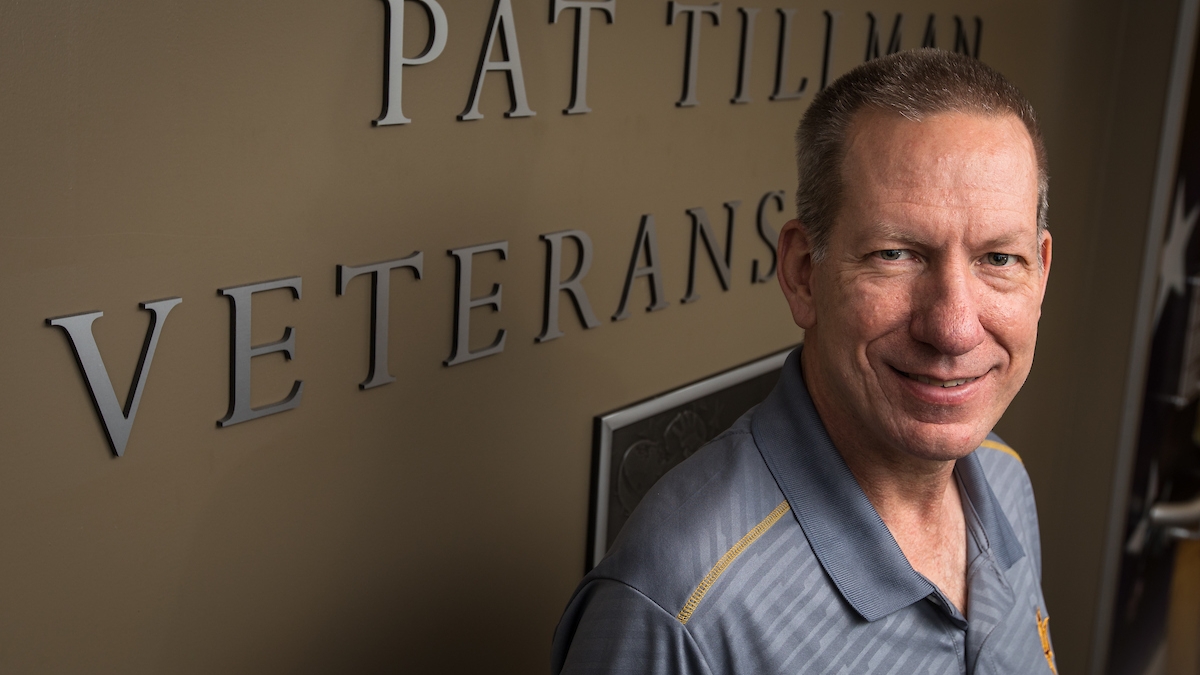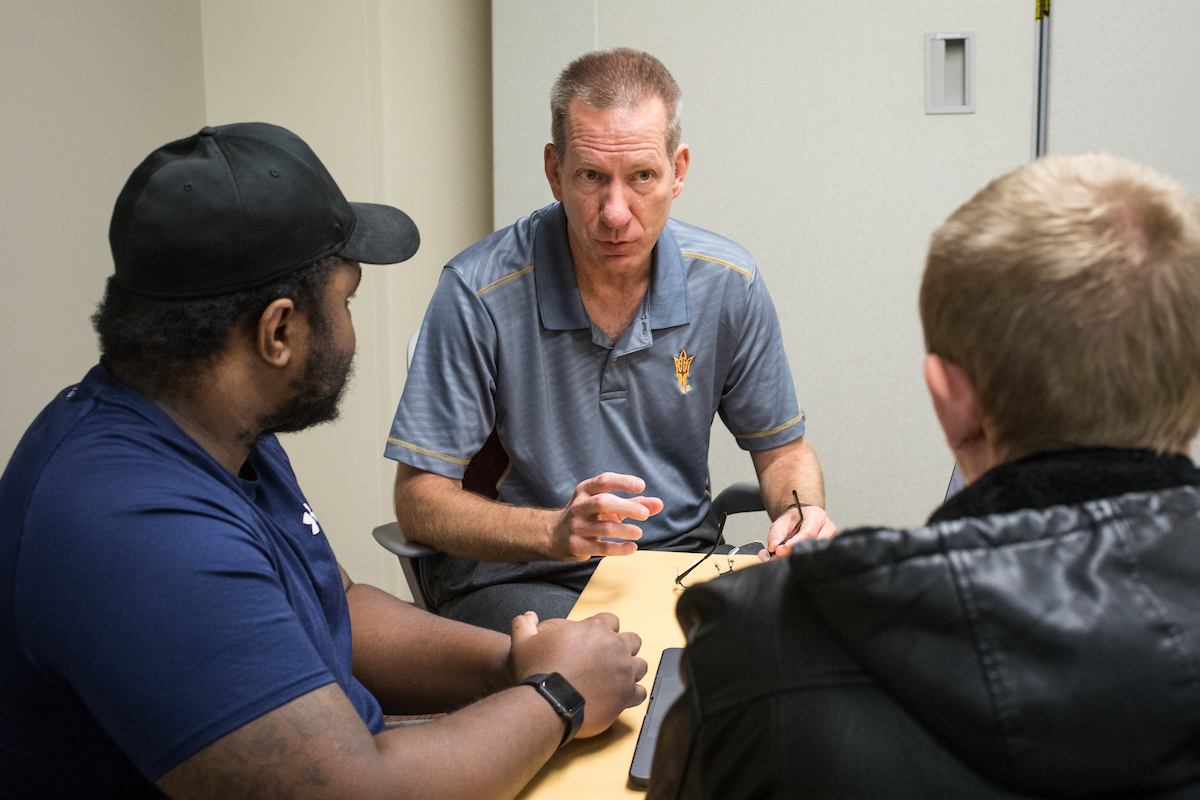Heading off to college is often the next logical step for many servicemen and women exiting the military.
But that next step is not necessarily an easy one as student veterans grapple with a host of challenging circumstances. Many soldiers return “home” only to find themselves having to learn how to navigate a culture that is completely different from the military. The social structure is different, the dress is different — the customs, protocols and even the language are not quite the same. For those adjusting to physical or invisible injuries, it can be even more daunting.
It's why Arizona State University’s Pat Tillman Veterans Center has made its primary mission to empower and support the veteran and military community in their pursuit of academic and personal success at ASU and beyond.
ASU Now spoke with Steven Borden, director of the veterans center, to discuss transitioning to a large university and what it means to be a “military-friendly” environment.
Question: What’s one thing veterans often don’t think to ask when they enter the university environment?
Answer: I think oftentimes the conversation with veterans using their education and going back to school is we don’t start off with the right question. When I say "we," I mean all of those that interact with veterans as they leave the military and start on their journey toward what is coming next. The question really should be, “Why are you interested in pursuing your degree?”
Some of them don’t know. They tell me, “Well, I just got out of the service and I don’t know what to do, so I’m using my GI Bill until I do.” We need to have a very special conversation with that student about possibly some other options for them. It may very well be that they don’t need to have a four-year degree. It could be they need some special training or education starting their own business and really set on entrepreneurship and might not necessarily need a four-year degree. If they have good experience and a solid business plan, maybe what they need is a connection to a business incubator. Here at ASU, we can do that through SkySong and there are some other national programs to which we can connect them.
If we don’t start with that “Why?” question and help them think through what they want to achieve while they’re here, then those conversations happen at the tail end of their degree. That conversation is not necessarily a pretty one. Our students need to be thinking about what they want to do after ASU. Short, intermediate and long-term plans should be identified, and we can help make sure that those plans are properly aligned.
Q: What are some of the things that the Pat Tillman Veterans Center does to get vets acclimated to campus life?
A: It starts with our initial communication with veterans even before they arrive at ASU. We talk to them about what to expect here. We talk to them about opportunities in which to engage whether it be student academic opportunities, professional development or student/veterans’ clubs.
The Tillman Center itself provides a connecting point for student veterans, and we hold veteran-specific welcome events on each campus. We also have a student-success class for veterans, which is a great place for them to get an ASU 101 perspective in a cohort of their peers.
Pat Tillman Veterans Center Director Steve Borden (center) talks with retired Marine Eli Robles (left) and fellow engineering management senior Josh Miller about a project they're working on. Borden, a retired captain, began ASU's Naval ROTC and is the center's first director. Photo by Charlie Leight/ASU Now
Q: Who do most veterans hope the public will think about as Veterans Day approaches?
A: There’s a couple of thoughts with respect to that. One of them is understanding the difference between Veterans Day and Memorial Day. We often get those two days confused. Memorial Day is about remembering our service members that paid the ultimate sacrifice in service to this country. Veterans Day is a day of thanks to the veterans who are still with us.
There are two prevailing narratives in our society about our veterans, and both of them are unhealthy. The first is that veterans are broken and we should thank them for their service, but almost in a pitying way. You know, “I’m sorry you had to go through that.” The other narrative is that veterans are heroes. Both are unhealthy perspectives with respect to what the veteran community is about. Veterans are people who have a heart for service. Today’s military is an all-voluntary service. They have chosen to serve. They served honorably, and they’re going on to do something else. They’re looking for a way to reintegrate into society and to continue being a contributing member and somebody who is continuing to serve their community.
If we can use Veterans Day as a way of highlighting those individuals who are successfully making that transition back, we will be telling a story of our service people that is more reflective of what the veteran community is about.
Q: What are the challenges and advantages of veterans attending ASU after their military service?
A: When you look at ASU’s charter and see that our success is defined not by whom we exclude but by whom we include, and how our students succeed, it is definitely an advantage for our veterans to know that ASU wants them here. They are an important element of diversity to our student body. Only about 1 percent of our nation is in uniform at any given time, and to have a significant number of students that chose to serve our country through military service and then chose to attend ASU broadens the perspectives, experiences and depth of diversity of the ASU community.
A college education is not a transactional experience. It’s just not the matter of going to class, passing your courses and getting your degree. At an institution like ASU, veterans have the opportunity to interact with top faculty members in the nation in their respective fields, they can get involved with research opportunities, there’s a wide array of internships, fantastic professional career resources, and, generally speaking, unparalleled opportunity for people that have left the military service. Then, when you tie that together with the academic rigor of being in a Tier 1 research institution, they should really be able to launch into their next career.
I believe we do veteran services correctly here at ASU. We play a direct role in empowering veterans to use their veteran education benefits; they still have to do the work, but they can leave here to become the next "Greatest Generation."
Top photo: Pat Tillman Veterans Center director Steve Borden works with vets attending ASU, assisting them with their academic, social or financial issues. Often, he will count on veterans' expertise to help with the center's goals. Photo by Charlie Leight/ASU Now
More Sun Devil community

A champion's gift: Donation from former Sun Devil helps renovate softball stadium
Jackie Vasquez-Lapan can hear the words today as clearly as she did 17 years ago.In 2008, Vasquez-Lapan was an outfielder on Arizona State University’s national championship-winning softball team,…

Student-led business organization celebrates community, Indigenous heritage
ASU has seen significant growth in Native American student enrollment in recent years. And yet, Native American students make up less than 2% of the student population.A member of the Navajo Nation,…

Remembering ASU physical chemist Andrew Chizmeshya
Andrew Chizmeshya, a computational chemist and materials scientist whose work spanned over three decades at Arizona State University, died on March 7 at the age of 63.A dedicated mentor and cherished…



